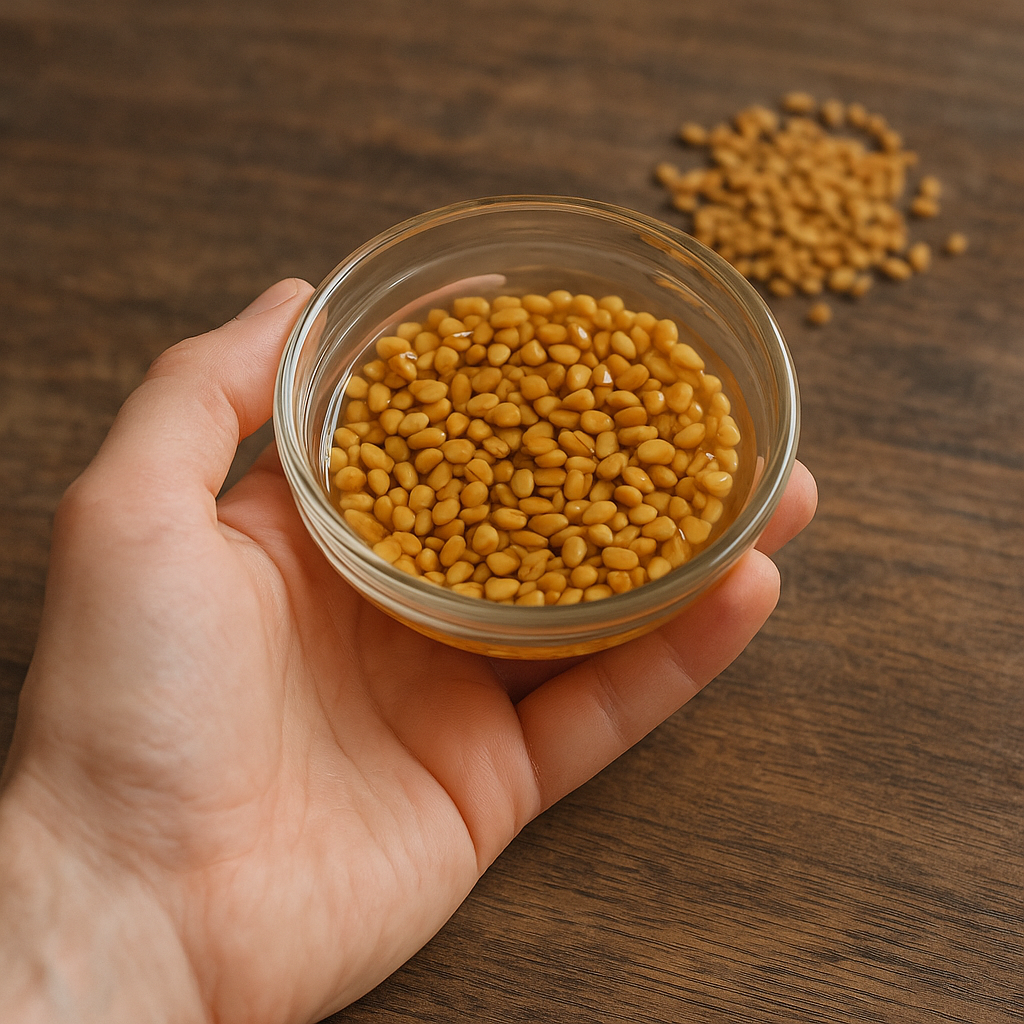Ask Ayurvedic doctor a question and get a consultation online on the problem of your concern in a free or paid mode. More than 2,000 experienced doctors work and wait for your questions on our site and help users to solve their health problems every day.
How to Consume Fenugreek Seeds for Health, Hair, and Hormones

Fenugreek seeds have been cherished for centuries, prized for their amazing health benefits and versatile uses. If you’ve been wondering how to consume fenugreek seeds to unlock their full potential, you’re in the right place. Whether you want to boost hair growth, support female health, or improve hormone balance, fenugreek seeds might just be the natural solution you need. In this article, we’ll explore the best way to consume fenugreek seeds, from soaked seeds to powders, and guide you on their practical uses. You’ll learn how to consume fenugreek seeds daily to address everything from breast growth and breast milk production to irregular periods and even diabetes management.
Let’s dive into the world of this humble seed and discover how its natural goodness can be part of your daily routine.
Fenugreek Seeds: Traditional Uses and Benefits
Fenugreek seeds, also known as methi, have a long history in traditional medicine across many cultures. They’re commonly used in Indian, Middle Eastern, and North African cuisines, but their uses extend far beyond the kitchen. The use of fenugreek seeds in herbal remedies includes improving digestion, reducing inflammation, and balancing blood sugar levels. They are loaded with nutrients like fiber, iron, and magnesium, which contribute to their health-boosting reputation.
One of the most popular benefits linked to fenugreek seeds is their role in hormone regulation, especially for women. They’re believed to mimic estrogen effects, which explains the interest in how to consume fenugreek seeds for breast growth and menstrual health. Moreover, fenugreek seeds have also gained attention for their potential to enhance testosterone levels in men and help control blood sugar, making them a versatile herb.

Don't wait or self medicate. Start chat with Doctor NOW
Best Ways to Consume Fenugreek Seeds
Soaked, Powdered, or Raw: What Works Best
So, what’s the best way to consume fenugreek seeds? It really depends on your goals and how your body reacts. One popular method is the use of soaked fenugreek seeds. Soaking softens the seeds, making them easier to digest and releasing beneficial enzymes. You can soak a tablespoon of seeds overnight in water and consume them first thing in the morning. This is a gentle way to start if you’re new to fenugreek.
Alternatively, you can grind the seeds into a powder and add them to smoothies, yogurt, or even sprinkle over salads. Powdered fenugreek can be slightly bitter, so mixing it with honey or lemon helps balance the flavor. Some people also prefer to chew the raw seeds directly for a more intense effect, but this might be harsh on the stomach if done in excess.
Daily Dosage and Timing Tips
When it comes to dosage, moderation is key. Most experts recommend about 1-2 teaspoons of fenugreek seeds daily, whether soaked, powdered, or raw. Starting with a smaller amount is smart, as fenugreek can cause digestive discomfort in some people if taken too much too soon. You might want to spread the intake through the day rather than consuming it all at once.
Timing can also matter. Many find the best way to consume fenugreek seeds daily is in the morning on an empty stomach to maximize absorption, especially if using soaked seeds. For specific benefits like how to consume fenugreek seeds for breast milk production, the frequency and timing can vary, so listen to your body and adjust accordingly.
How to Use Fenugreek Seeds for Female Health
Fenugreek seeds have a special place in women’s health due to their hormonal effects and nutrient profile. Let’s explore some of the key uses and how to consume fenugreek seeds to support female wellness.
Breast Growth, Breastfeeding, and Hormonal Balance
Many women ask how to consume fenugreek seeds for breast growth. Fenugreek contains phytoestrogens, plant-based compounds that mimic estrogen, which can influence breast tissue development. While scientific evidence is still limited, traditional use suggests that regular consumption of fenugreek seeds may support natural breast enhancement over time.
If you’re interested in fenugreek for breastfeeding, it’s one of the most well-known natural remedies for increasing milk supply. The use of fenugreek seeds for breast milk involves consuming soaked or powdered seeds daily. A common practice is to drink fenugreek seed tea or take fenugreek capsules, which can stimulate milk production for many nursing mothers. However, it’s best to consult your healthcare provider before starting fenugreek supplements if you’re pregnant or breastfeeding.
Irregular Periods and Menstrual Support
For women struggling with irregular periods, fenugreek seeds can be a natural aid. Fenugreek may help regulate menstrual cycles by balancing hormones and reducing inflammation. To use fenugreek seeds for this purpose, soak a tablespoon of seeds overnight and drink the water in the morning, followed by chewing the softened seeds. Doing this daily for a few weeks might help in improving cycle regularity. But remember, individual results vary, and consulting a gynecologist is advised.

Fenugreek Seeds for Hair Growth and Skin Wellness
The use of fenugreek seeds for hair is one of the oldest beauty secrets. These seeds are rich in proteins and nicotinic acid, both known to strengthen hair follicles and promote growth. The best way to consume fenugreek seeds for hair growth often combines topical and internal use.
Internally, consuming soaked or powdered fenugreek seeds daily can improve hair health from within. Externally, fenugreek seed paste or fenugreek oil applied to the scalp can reduce dandruff, soothe irritation, and stimulate hair growth. Many people soak the seeds overnight, grind them into a paste, and apply this directly to the scalp, leaving it on for 30 minutes before washing.
Besides hair, fenugreek’s antioxidants also benefit the skin by fighting free radicals and reducing signs of aging. Drinking fenugreek seed water or adding the powder to your diet can contribute to a glowing complexion.
Fenugreek Seeds for Men: Testosterone and Diabetes Control
Fenugreek seeds aren’t just for women—men can also benefit greatly from this versatile herb. The question often is how to consume fenugreek seeds for testosterone support and managing conditions like diabetes.
Fenugreek contains compounds called furostanolic saponins which are believed to stimulate the production of testosterone naturally. Men looking to boost their testosterone levels might consume fenugreek seed powder or soaked seeds daily, usually about 500 mg to 1 gram, though exact doses can vary. Incorporating fenugreek into your diet regularly can help improve muscle strength, libido, and overall energy levels.
On the diabetes front, fenugreek seeds have been traditionally used to regulate blood sugar. Their high fiber content slows down carbohydrate absorption, helping control blood glucose spikes. To leverage this, the best way to consume fenugreek seeds for diabetes is by soaking a tablespoon of seeds overnight and drinking the water before meals, or by adding powdered fenugreek seeds to your food daily. This natural approach can complement medication but should never replace medical advice.
Conclusion
Fenugreek seeds are truly a powerhouse herb, with uses ranging from hormone balancing and breast milk stimulation to improving hair growth and controlling blood sugar. Knowing how to consume fenugreek seeds properly can unlock these benefits safely and effectively. Whether soaked, powdered, or raw, incorporating fenugreek into your daily routine offers a natural, affordable way to support your health.
Remember, start with small amounts and observe how your body reacts. Always check with your healthcare provider, especially if you’re pregnant, breastfeeding, or have existing health conditions. Share this article with your friends and family so they can discover the incredible use of fenugreek seeds too!
FAQs
Can we eat raw fenugreek seeds?
Yes, you can eat raw fenugreek seeds, but they are quite bitter and tough. Soaking them overnight is often recommended to make them easier to digest and reduce bitterness.
Can we eat fenugreek seeds during pregnancy?
It’s best to consult your doctor before consuming fenugreek seeds during pregnancy, as they can stimulate uterine contractions in some cases.
Can we eat fenugreek seeds at night?
You can consume fenugreek seeds at night, but many prefer morning intake on an empty stomach for better absorption. Eating them at night won’t harm but may cause mild digestive discomfort for some.

